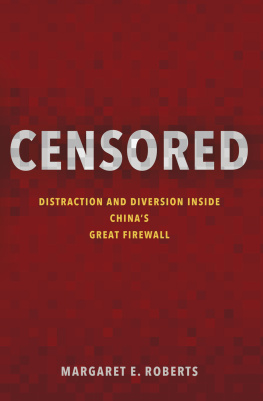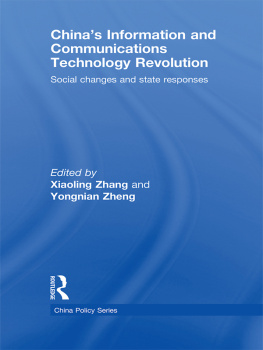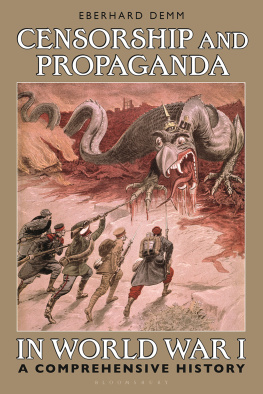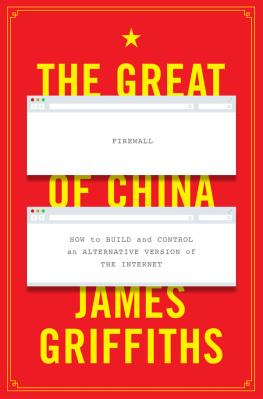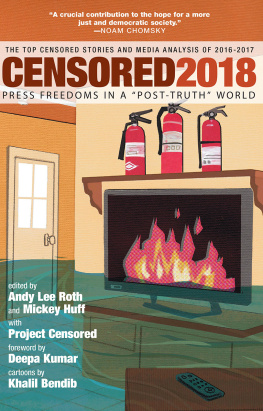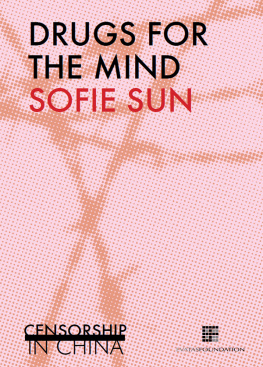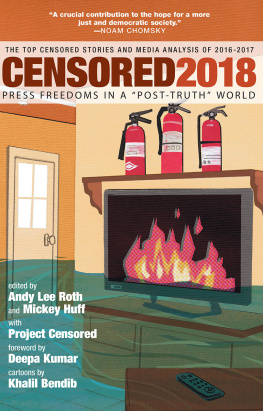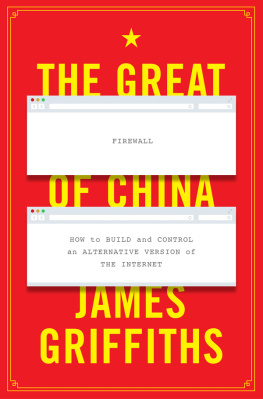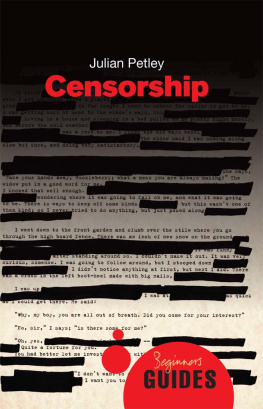
Censored
Censored
DISTRACTION AND DIVERSION INSIDE CHINAS GREAT FIREWALL
Margaret E. Roberts
PRINCETON UNIVERSITY PRESS
PRINCETON AND OXFORD
Copyright 2018 by Princeton University Press
Published by Princeton University Press,
41 William Street, Princeton, New Jersey 08540
In the United Kingdom: Princeton University Press,
6 Oxford Street, Woodstock, Oxfordshire, OX20 1TR
press.princeton.edu
All Rights Reserved
ISBN 978-0-691-17886-8
Library of Congress Control Number 2017962808
British Library Cataloging-in-Publication Data is available
This book has been composed in Minion Pro
Printed on acid-free paper
Typeset by Nova Techset Pvt Ltd, Bangalore, India
Printed in the United States of America
10 9 8 7 6 5 4 3 2 1
For my parents,
Don and Barbara Roberts
CONTENTS
ACKNOWLEDGMENTS
Writing a book is not something done in solitude; rather, it is reliant on the insights, conversations, support, and feedback of an entire community. I am indebted to many for their help throughout this process. The origins of this book are in my conversations with Gary King and Jennifer Pan, with whom I originally began working on censorship and who encouraged me to pursue the idea beyond what is censored to how censorship impacts people. Their ideas and feedback are embedded in this work, and I am thankful to them for being wonderful mentors, collaborators, and friends. Similarly influential was Brandon Stewart, whose work appears within this manuscript, and who through a long friendship and collaboration has strongly impacted how I think both about data analysis and social science.
This book grew out of my dissertation that began at Harvard. I owe a great debt to my many colleagues in graduate school whose ideas, criticisms, and friendship enriched my time at Harvard and vastly improved my work. Not only Brandon and Jen, but also the rest of my reading groupShelby Grossman, Chiara Superti, Amanda Pinkston, and Vanessa Williamsonread many versions of my work and provided invaluable feedback. My dissertation committeeGary King, Jeff Frieden, Elizabeth Perry, and Dustin Tingleyprovided me with incredible feedback and support throughout my time at Harvard. They provided outstanding examples of scholars and teachers, and I learned a tremendous amount from them.
When I moved to University of California, San Diego, I was immediately welcomed into a warm community of scholars who took me under their wing. I could not be more indebted to Susan Shirk and Lei Guang and the 21st Century China Center for providing feedback, mentorship, and funding while I was finishing the manuscript. My other colleagues in Political Science, School of Global Policy and Strategy, and at the San Diego Supercomputer, in particular Claire Adida, Jude Blanchette, Jesse Driscoll, Amarnath Gupta, James Fowler, Stephan Haggard, Seth Hill, Ruixue Jia, David Lake, Kai Lin, Megumi Naoi, Barry Naughton, Simeon Nichter, Sam Popkin, Christina Schneider, Branislav Slantechev, Victor Shih, David Wiens, and Yiqing Xu, were generous with their time and provided me invaluable feedback on my work. Thanks to Justin Grimmer, Tim Groeling, Xiao Qiang, and Jeremy Wallace for traveling to San Diego and providing detailed feedback on the manuscript for my book conference. Thanks to Will Hobbs who worked with me on censorship and who helped me think more deeply about how sudden information changes can impact censorship outcomes.
I offer thanks to those people who supported me during my fieldwork in China. In particular, Kai Lukoff and Maoliang Ye provided incredible support and valuable conversations during my time in Beijing. A special thanks to Tianguang Meng for his tremendous insights and support. Peter Volberding and Jeff Javed were the best fieldwork roommates anyone could ask for. Thanks to Frances Chen, Yichen Guan, Yingjie Fan, Amy Jiang, Adam Jin, Heather Liu, Junjie Liu, Fei Meng, Hongmiao Wang, and LuShuang Xu for their assistance at different points in the process. Thanks also to those who helped me who prefer to remain anonymous.
Many others provided valuable feedback throughout the process. Other than those I have already listed, Alexei Abrahams, Pablo Barbar, Chris Cairns, Any Catalinac, Joan Cho, Jeff Colgan, Greg Distelhorst, Ruben Enikolopov, Roya Ensafi, Nick Feamster, Scott Gehlbach, Anita Gohdes, Judy Goldstein, Sheena Greitens, Andy Hall, Jingkai He, Nancy Hearst, Yue Hou, Haifeng Huang, Kyle Jaros, Ashley Jester, Iain Johnston, Aaron Kaufman, Jeehye Kim, Patrick Lam, Peter Lorentzen, Chris Lucas, Andrew MacDonald, Dan Mattingly, Gwyneth McClendon, Blake Miller, James Ashley Morrison, Rich Nielsen, Maria Petrova, Maggie Peters, Jakub Redlicki, Jake Shapiro, Daniel Smith, Jim Snyder, Arthur Spirling, David Steinberg, Zachary Steinert-Threlkeld, Daniel Treisman, Alex Storer, Brian Tsay, Sam Tsoi, Disy Trinh, Rory Truex, Josh Tucker, Felicity Vabulas, Jessica Weiss, Vanessa Williamson, Yuhua Wang, Jason Wu, and Yin Yuan. For those who I have forgotten to list, it is not out of lack of appreciation but rather out of my own forgetfulness.
This book would not have been possible without the financial support of generous research institutions. I thank 21st Century China Center, the Carnegie Corporation of New York, the Policy Design and Evaluation Lab, National Science Foundation (grant 1500086), DARPA (contract W31P4Q-13-C-0055/983-3), Hellman Fellows Fund, Institute for Quantitative Social Science, and the Weatherhead Center for International Affairs for financial support. I thank the Ashford family for their generous funding and personal support throughout my time at Harvard through the Ashford Fellowship.
Thanks to Eric Crahan and those at Princeton University Press for their support throughout the process. The book was much improved by anonymous reviewers who read this manuscript and provided feedback. Thanks also to Madeleine Adams for reading and improving the manuscript.
A final thanks to my wonderful family for entertaining and improving my ideas and reminding me to take breaks. First and foremost, thanks to my husband David for constantly challenging me to communicate my ideas more clearly, providing me unconditional love and support, and for being an outstanding example of a scholar. This book would not have been possible without him. Thanks to my siblings Emily, Heather, and Allen for reading the book many times, entertaining me with food, jokes, and playlists, and reminding me to speak to a broader audience. Thanks to my first teachers and mentors, my parents Don and Barbara, for three decades and counting of thought-provoking conversation. I have always tried to emulate their thirst for knowledge and commitment to truth. I dedicate this book to them.
Censored
CHAPTER ONE
Introduction
China has four million websites, with nearly 700 million Internet users, 1.2 billion mobile phone users, 600 million WeChat and Weibo users, and generates 30 billion pieces of information every day. It is not possible to apply censorship to this enormous amount of data. Thus censorship is not the correct word choice. But no censorship does not mean no management.
Lu Wei, Former Director, State Internet Information Office, China, December 2015
1.1 THE PUZZLE OF POROUS CENSORSHIP
As more people around the world gain access to the Internet, government censorship seems an increasingly futile exercise. Traditional conceptions of censorship that could completely control information, such as watertight bans on access, prepublication review, or government-enforced prohibitions on content, seem silly when you consider that every second millions of Internet users around the world are sending one another instant messages, participating in online forums, and tweeting to hundreds of thousands of followers. Even the worlds most famous censors recognize this reality. As the former gatekeeper of the Chinese Internet Lu Wei stresses in the epigraph to this chapter, the thirty billion pieces of information generated each day by Chinese citizens quite simply cannot be censored.
Next page
